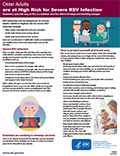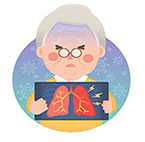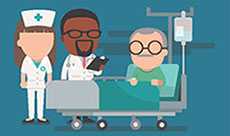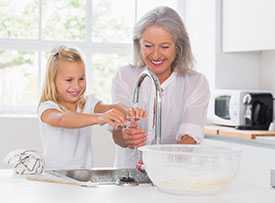Older Adults Are at High Risk for Severe RSV Infection

Get the PDF version [1 page] (en inglés) of this fact sheet.
Respiratory syncytial virus, or RSV, is a common virus that affects the lungs and breathing passages.
RSV infections can be dangerous for certain adults. Adults at highest risk for severe RSV infection include
- Older adults, especially those 65 years and older
- Adults with chronic heart or lung disease
- Adults with weakened immune systems
Each year an estimated 177,000 older adults are hospitalized and 14,000 of them die in the United States due to RSV infection.
Severe RSV infection
When an older adult gets RSV infection, they typically have mild cold-like symptoms including runny nose, sore throat, cough, and headache. But RSV can sometimes lead to serious conditions such as:

- Pneumonia (infection of the lungs)
- More severe symptoms for people with asthma
- More severe symptoms for people with chronic obstructive pulmonary disease (COPD) (a chronic disease of the lungs that makes it hard to breathe)
- Congestive heart failure (when the heart can’t pump blood and oxygen to the body’s tissues)
Older adults who get very sick from RSV may need to be hospitalized. Some may even die. Older adults are at greater risk than young adults for serious complications from RSV because our immune systems weakens when we are older.

Scientists are working to develop vaccines
There is no vaccine to prevent RSV infection yet, but scientists are working hard to develop one. If you are concerned about your risk for RSV, talk to your doctor.
How to protect yourself and loved ones
RSV season occurs each year in most regions of the U.S. during fall, winter, and spring. If you are at high risk for severe RSV infection, or if you interact with an older adult, you should take extra care to stay healthy:
-
Wash your hands often
Wash your hands often with soap and water for 20 seconds. If soap and water are not available, use an alcohol-based hand sanitizer. Washing your hands will help protect you from germs. -
Keep your hands off your face
Avoid touching your eyes, nose, and mouth with unwashed hands. Germs spread this way.
-
Avoid close contact with sick people
Avoid close contact, such as kissing, and sharing cups or eating utensils with people who have cold-like symptoms. -
Cover your coughs and sneezes
Cover your mouth and nose with a tissue when coughing or sneezing. Throw the tissue in the trash afterward. -
Clean and disinfect surfaces
Clean and disinfect surfaces that people frequently touch, such as doorknobs. When people infected with RSV touch surfaces and objects, they can leave behind germs. Also, when they cough or sneeze, droplets containing germs can land on surfaces and objects. -
Stay home when you are sick
If possible, stay home from work, school, and public areas when you are sick. This will help protect others from catching your illness.
- Page last reviewed: September 5, 2017
- Page last updated: September 5, 2017
- Content source:


 ShareCompartir
ShareCompartir